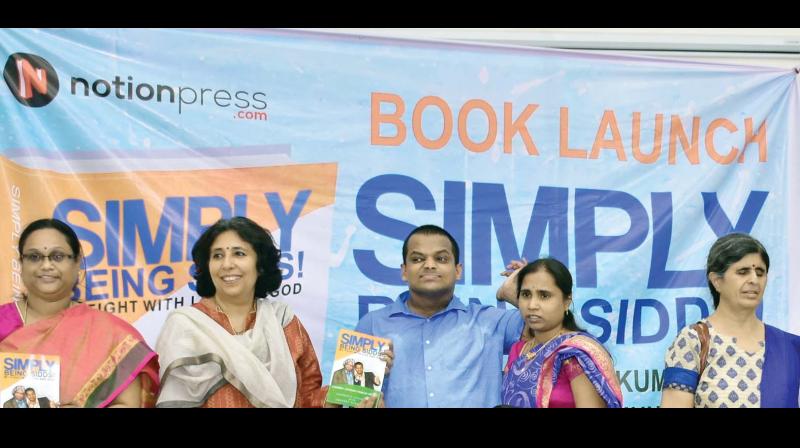A moving tale of a differently-abled child
That journey began on June 5, 1980, in Chikmagalur in Karnataka.

Chennai: Fruits are the uses of adversity, as the eternal bard Shakespeare said. This could not have been truer than in this saga of social differentiation and suffering to overcome an unexpected disability at birth over a period of 30 years by the hero of this moving memoir, Siddu, aka Siddharth Jayakumar.
Penned in collaboration with his friend Umasree Raghunath, this is the story of the indefatigable mastery in the making of a seemingly ugly manifestation in an otherwise normal boy. That journey began on June 5, 1980, in Chikmagalur in Karnataka. Though born a bit premature, the baby after three days was afflicted with jaundice as “there were no good facilities in the hospital.”
“The child became unconscious the sixth day. He got subsequent treatment in a good hospital, but as he grew we realised that his milestones were getting delayed like head holding to the neck, rolling, sitting, standing, etc.” “When we took him to doctors, he was diagnosed with mental retardation. We were shocked,” recalls Siddu’s mother, Komala Jayakumar in the book.
As one, with compassion and will, who took the major part of the burden-sharing in helping Siddu fight cerebral palsy (CB), along with her husband Jayakumar— a PR professional and known in Chennai media circles for his warmth and friendliness as ‘SPIC Jayakumar’ - Komala sharing her pain and joy in mainstreaming her boy is also a singular tribute to the patience and fortitude of our mothers at home.
As Siddu says, this memoir “is straight from my heart” and its authentic first person account reinforced by a string of voices- weaved into the narrative- of those who were near and dear to Siddu and eminent public persons like the late President Dr APJ Abdul Kalam who came to recognise the potential in Siddu, openly likening his almost impossible journey to self-reliance to that of Albert Einstein and Srinivasa Ramanujan.
The hyperbole may have been purely inspirational given the great science teacher Dr Kalam was, but this reference by Dr Kalam is the “best gift in my life”, says Siddu. In the case of both those geniuses of Physics and Mathematics respectively, it was a teacher spotting them at the right time that made all the difference to their great intellectual contributions to the world of knowledge later, Dr Kalam recalled later in a speech in New Delhi at a National Awards function on December 3, 2005 in which he dwelt a considerable part to the travails of this spastic youth Siddharth Jayakumar, who had met the late President just only the previous day in Chennai along with his parents.
Likewise for Siddharth, his teachers at Vidya Sagar (formerly Spastics Society of India) at Bengaluru and Chennai, made all the difference in those initial excruciatingly painful years to be able to sail through with confidence from the special school to a mainstream school, taking his education forward.
It has been an amazing journey and but for the Jayakumars’ neighbour in Bengaluru earlier, who was working with the Spastic Society of India there and who advised the couple to put their boy in their special school, this journey may not have begun at all.
Siddu in this evocative self-portrait in a simple and engaging style has beautifully sequenced every stage of this journey of mind over body, in a way that should defeat defeatism for differently-abled children. From his first teacher at Vidya Sagar (VS), before his family later moved over to Chennai, learning to type with just one hand and one finger, “my first means to communicate,” as Siddu puts it, his subsequent teachers at VS, the same special school in Chennai, they were great stepping-stones to his moving over later to class eight in a normal Matriculation school here. Their love, patience and affection, combined with his mother burning the midnight oil, enabled Siddu’s integration into a mainstream school.
Siddu remembers each one of them with gratitude, particularly teachers like ‘Dipti Akka’ who relatively played a larger role in his formative days and Usha Ramakrishnan, before he struggled to move on to do his B.Com. in Vivekananda College and later his P.G. in Loyola College. Nothing was easy and he was not getting the course he exactly liked. “Science was a big headache due to practicals and diagrams, though I loved the subject as a whole,” writes Siddu. Later, convincing the college authorities was even tougher.
Even as making friends for a spastic boy was so arduous, Siddu’s quest for his first job was even harder, until he was selected by ‘ABN AMRO’ at a ‘Disability Job Fair’ in December 2004, organised by the ‘Ability Foundation’. There was then no turning back for Siddu. At the workplace, he mastered the ‘documents checking’ job in no time, “the toughest part of trade finance” for any trainee. He later became “India’s first certified Documentary Credit Specialist (CDCS from Institute of Financial Services, UK) in 2006, with cerebral palsy. Now, he is also a sought-after motivational speaker at various forums.
By all means, it is an inspiring self-portrait, which also dovetails aspects of his familial ties including his sister Seema, his marriage to Chandrakala, which Siddu describes as a ‘miracle’, and what his friends and teachers have to say of his self-overcoming journey, including by his ‘Godmother’, Ms. Poonam Natarajan, Founder of ‘Vidya Sagar’. Equally hope-infusing it should be for parents struggling to cope with their differently-abled children.
“Don’t treat my ills, teach me skills,” was Siddu’s one phrase that Dr Kalam liked most. What disabled children need is empathy, not mawkish sentimentality.

